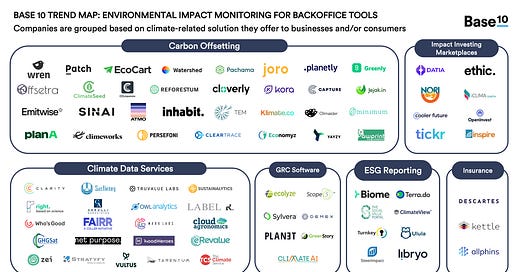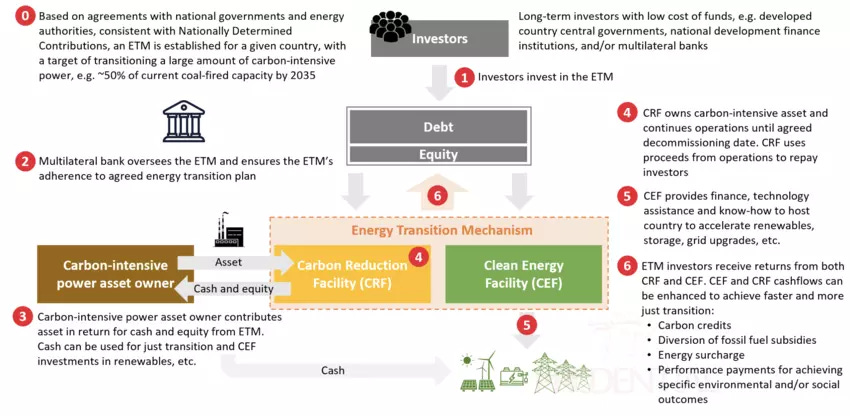#20) Climate finance + startups (3-minute roundup)
75+ environmental monitoring startups (market map). $100B in savings to retire coal. Green steel? Carbon-free oil? LCA on EVs. 6 emerging tech trends. It's 100% your fault. Got "Think Time?"
Geek out on 75+ startups in environmental monitoring and ESG analytics.
Shout out to automation-focused VC firm, Base10, for this enticing market map below and their related explanation behind it here.
And if you want even more — investor lists, categorization by venture round and geography, founders — check out their Research page here.
The takeaway?
Companies need help doing the right thing re: climate, sustainability, diversity, and social impacts, especially if it’s not their raison d'etre.
(Sorry to go all snooty, but this French version of “reason for being” just kept tugging at me. Rest assured: I can barely pronounce anything in that lovely language.)
If it’s hard, it won’t scale. So companies like these aim to make all that easier.
Coal still dominates outside of the US/EU. We need a new financing mechanism to change that.
This image from BP Statistical Review of World Energy may surprise you, as it did me.
(“Wait, I thought coal was economically and environmentally dead?”)
But as Donald Perry Kanak (Chairman, Prudential Insurance Growth Markets, Prudential) notes in a recent World Economic Forum piece, we need “COP26 energy transition mechanisms (ETMs) — large public private partnerships that would enable countries to remove political and socio-economic barriers, create sustainable jobs to support a green post-COVID recovery, and move much faster to achieve a just energy transition.”
Note: You may want to grab that second cup of coffee before digesting this helpful graphic.
And if you’d like to further wonk out, here’s a related plan from RMI that could generate net financial savings of over $100B by 2025 — How to Retire Early: Making Accelerated Coal Phaseout Feasible and Just.
Shout out to Jeff Weiss, Executive Chairman at Distributed Sun, for bringing this to my attention.
Steel is dirty. Wait, it’s green?
It’s both.
Steel manufacturing represents about 8% of global greenhouse gas emissions.
And it’s a commodity. Or is it?
Steel and mining giant ArcelorMittal — who last fall made a commitment to being carbon neutral by 2050 — is now rolling out its new initiative called XCarb that aims to reduce carbon emissions in steel production and pass these climate benefits onto customers seeking to offset Scope 3 (supply chain) impacts.
Learn more from Environmental + Energy Leader here.
Is this the first of many commodity products aiming for (and achieving?) market and pricing differentiation on the basis climate attributes?
Consider the world’s first carbon-free oil shipment from Oxy Low Carbon Ventures, a subsidiary of Occidental Petroleum, to Reliance in India thanks to Macquarie’s efforts earlier this year. More from S&P Global here.
The carbon offsets used were verified under the “Verra Verified Carbon Standard program, meeting eligibility criteria for the UN's International Civil Aviation Organization's Carbon Offsetting and Reduction Scheme for International Aviation, or CORSIA.”
That’s a lot of words. Will they pass muster?
What about the climate impacts of manufacturing electric vehicles?
A friend recently asked me this question, so I had to look it up.
(Thanks for the homework, Jonathan Hornaday.)
A few years back the Union of Concerned Scientists conducted a “two-year review of the climate emissions from vehicle production, operation, and disposal.”
The answer?
Battery electric cars generate 50% less emissions versus the average comparable gasoline car, even after accounting for pollution from battery manufacturing.
And if you’re curious about the operational GHG benefits of EV based on the power grid where you live, then check out this calculator from the U.S. Department of Energy’s Alternative Fuels Data Center.
6 emerging tech trends — Super or superfluous?
Fewer smartphone sales, but more wearables sold — Are we smarter? More distracted? More alive?
Remote work is here to stay, even after the vaccines or herd immunity — “OK, just stay seated and they can’t see the pajamas.” If you’re still feeling like a noob, check out this book: Remote: Office Not Required.
Tech giants enter healthcare as the next battleground — Healthcare is already so broken in the U.S., can it get any worse? And they already know so much about us, is this really that big of a step?
"Home of Things" industry to grow — No, not the Internet of Things (IoT), but instead HoT (oh yeah, baby!). Can my recycle bin notice that I need to buy more milk? I would have never known that otherwise!
Antitrust may be impossible — As tech giants creep into new sectors, efforts to limit their power intensify, but it is true that “No U.S. laws prohibit being really, really smart?”
Cryptocurrency and social payments to go mainstream — Peer-to-peer payment services like Venmo, Apple Pay, Google Pay? Seems helpful to reduce friction. The rise of cryptocurrency with Wall Street and national governments getting in the game? My head spins. More here via a PwC primer.
Thanks to futurist Amy Webb and Inc.com for this writeup.
On taking personal responsibility, even if you think it’s not your fault.
Consider this story from Anthony de Mello, a Jesuit mystic and author.
(If that sounds like an oxymoron, I hear you. He was an Indian Jesuit priest and psychotherapist, an apparent Buddhist, and a wise man beyond conventional definitions.)
—
The doctor says, “Very well, I’ve understood your symptoms. Do you know what I will do? I will prescribe a medicine for your neighbor!”
The patient replies, “Thank you very much, Doctor, that makes me feel much better.”
Isn’t that absurd? But that’s what we all do.
The person who is asleep always thinks he’ll feel better if somebody else changes.
If we're going to "fix" something — personally or professionally — we need to take full responsibility for it, not assuming that changing someone else alone will make things all better.
—
As Kristina Skierka* told my Duke University students this week:
“Instead of pointing the finger, we point in the direction.”
That is, seek solutions, not blame.
(* Kristin is the CEO of Power for All, a visionary leader in off-grid clean energy for the world’s 800 million people with no access to power.)
—
And author James Clear puts a different but related spin on this theme:
“Attention is the oxygen of conflict. When you fight a problem, you breathe life into it. When you starve a problem of your attention, you suffocate it. In a surprising number of cases, the way to solve a problem is to ignore it.”
—
So, how are you the source of some of your problems that you think are mainly caused by someone else?
And how are you taking 100% responsibility to solve it, at least inside of your own head and heart?
Do you have “Think Time” built into your work schedule?
We’re all so busy. And praised for getting sh*t done.
But real leaders are able to delegate, automate, systematize, or avoid certain tasks such that they have space and time to think.
Hence, “Think Time.”
Can you build an hour into each day?
Or perhaps two blocks of three hours each during the week for Deep Work or expansive thinking?
As an added bonus, try to walk while you think. Science, and some of history’s biggest thinkers, shows that it helps neurons work better. Read more from the New Yorker here.
Shout out to Nicole Poindexter for this insight. Nicole is a member of our Climate CEO Mastermind and Founder of Energicity, which develops and operates solar + storage minigrids serving communities in West Africa.
Got feedback?
I craft these newsletters on email-free Friday mornings to help you scale ventures and investments that address climate change, boost personal productivity, and become better leaders.
Tell me what you want to see more of.
How can this be more useful (or entertaining) to read?
Consider sending me a 2-3 line email before your next coffee break.
Or connect on LinkedIn and drop me a note there.
Got a friend who might enjoy ZERO?
I appreciate the many weekly shares, connections, sign ups, and emails.
Keep ’em coming.
Make it a great week,
Chris
P.S. If you’re a woman, BIPOC, or LGBT Founder or CEO in the climate space, and have raised some capital, I want to hear from you. Our sectors have a diversity problem, and that sh*t’s gotta change.
--
Dr. Chris Wedding
Founder and Chief Catalyst, Entrepreneurs for Impact
Private Roundtables, Investor Intelligence, and Executive Coaching for Climate CEOs








